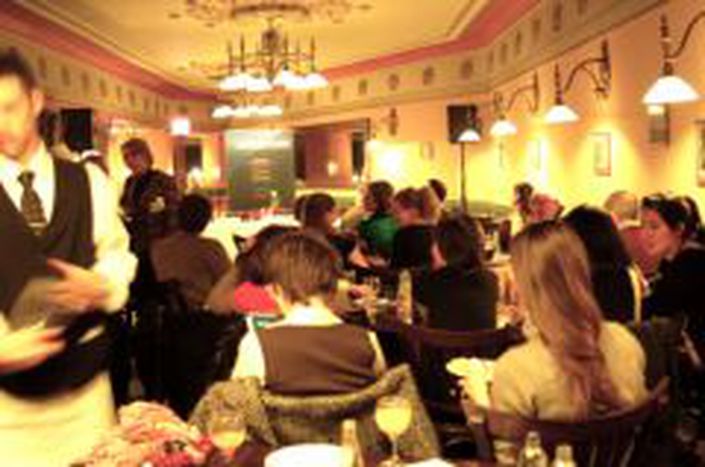
Innovation could be a basic for recovering
Published on
6th of March was a general grey, rainy day in Budapest. In the central of the Hungarian capital many people walked around, went home after a busy day like usual. At the same time it wasn’t an ordinary Thursday for Babelians: in the historical downtown café called Central the next event of EU Debate on the ground took place.
It was Budapest’s turn to be on the ground and we could not choose a more actual topic that the crisis and its relation to creativity and innovations.
Central was full of Hungarian and international Babelians: students, journalists, young researchers and others being interested in this issue. The crowd is not a surprise: everyone is concerned, everyone is curious what kind of answer could we give to the global economic crisis. The topic was related to the economic downturn and the debate had the following title: Research and innovation – a possible answer to the global crisis?

As usual, Budapest team tried to show all aspects of the question this time as well and invited four prestigious guest speakers to the debate: István Fodor, former president of Ericsson Hungary, member of the Wise's Council ; Áron Losonczi , architect, inventor of LitraCon, ambassador of the European Year of Creativity and Innovation 2009 ; Tivadar Lippényi, the vice president of the National Office for Research and Technology and Balázs Lengyel, researcher of the Institute for World Economics of the Hungarian Academy of Sciences helped us to understand ongoing processes of the global economy and to find innovation’s place in this complex mechanism. The debate was moderated by Éva Csorba, member of Babel Budapest team.
Innovation and education: basics of recovery
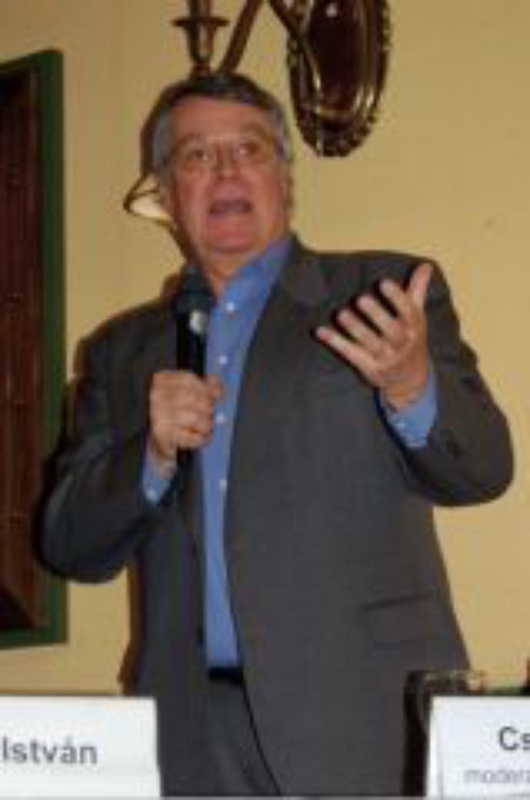 István Fodor before answering to the first question if research or innovation is a real opportunity to face the crisis, firstly gave voice to his pleasure, how nice it was to see many young people gathered together and being interested in this topic. To come to the point he said: „To ride the crisis innovation alone is not enough but could be the basic of recovery.” Mr Fodor also said that since nowadays an economy strongly depends on technology, research and innovation are crucial in respect of economic growth. These two industries are the most appreciated ones, so it is fundamental to focus on them. He emphasized the importance of education as well: „We have to bridge the gap what is experienced in Hungarian education of natural sciences, we need young, creative minds and leave them to get enough place for their work. It can be realized only in case this area becomes more attractive for the students.”
István Fodor before answering to the first question if research or innovation is a real opportunity to face the crisis, firstly gave voice to his pleasure, how nice it was to see many young people gathered together and being interested in this topic. To come to the point he said: „To ride the crisis innovation alone is not enough but could be the basic of recovery.” Mr Fodor also said that since nowadays an economy strongly depends on technology, research and innovation are crucial in respect of economic growth. These two industries are the most appreciated ones, so it is fundamental to focus on them. He emphasized the importance of education as well: „We have to bridge the gap what is experienced in Hungarian education of natural sciences, we need young, creative minds and leave them to get enough place for their work. It can be realized only in case this area becomes more attractive for the students.”
As we know, everything is based on education. Companies and institutions had to support talented students, give them opportunity to wise their knowledge. „The cooperation with universities is obvious. The development of the education is the task of the country and not of the economy. A vital politics is also crucial.” – said István Fodor. Government has a serious role of course but nowadays only 1% of the budget goes to innovations. It was a shocking example for everyone that University of Standford supports innovation with more money than Hungary.
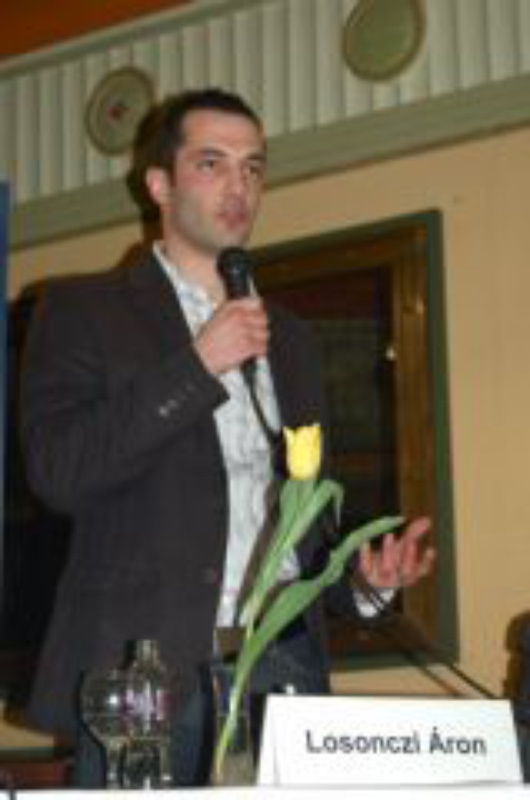 Scandinavia again (of course)
Scandinavia again (of course)
Éva rose the question that almost everyone from the audience wanted to put on to our youngest guest Áron Losonczi the successful inventor of LitraCon: which way a young person can utilize his or her knowledge? The answer was not that obvious as the question. Mr Losonczi said that everybody needs some time and place to be creative, „I found it in Sweden” – he announced. If someone has an idea, it needs to be protected. Swedish government has seen the reason already that creative minds are crucial for a country. „In Sweden I needed only two days to make my invention registered in the patent office. In Hungary the bureaucracy is so huge and there is no common language with the decision-makers. Creative minds need support and help. It is the only way to be rewarding for a country.”
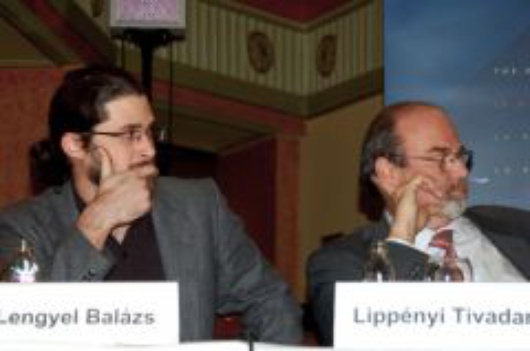 Actually what is innovation?
Actually what is innovation?
The answer seems not too obvious in respect of the arguments that this question has made. At first, Balázs Lengyel made a clear difference between research and innovation. „R&D means different activities aiming to solve a problem or to touch the spot. On the contrary, innovation is a mechanism running the economy, the economic reform.” Áron Losonczi completed this definition: „When we are generating knowledge from money, it’s called R&D. If we are making money made with the use of knowledge it’s called as innovation.” Balázs Lengyel called innovation as a concept of an umbrella. One part of it is research of course but the other part is related to the launching of a brand new technology. It is crucial to have an idea to become a new product. If it is done – it is innovation.
And what about the EU?
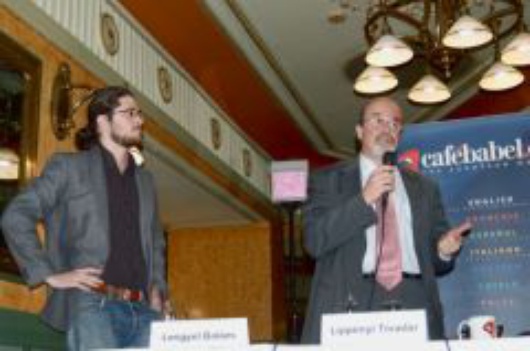 In connection with the crisis Tivadar Lippényi said that research and development is the only way to get over the economic disaster. „Those entrepreneurs who do not work with research or innovation can be bankrupt easily. The importance of R&D is shown as well from the fact that contrary to other sectors R&D budget is still kept usually.” Regarding to the European Union he said that the Lisbon Strategy was a good way to start to work more seriously on R&D programs but the realization of it does not show an optimist picture. “EU set the aim to be the most dynamic economy of the world until 2010 but to be honest we do not have to think about a lot how far is this goal from reality.” – he added. Due to the crisis people are dissatisfied in each member state. EU is also complaining because the speed and efficiency of researches are not good enough. It is crucial to give opportunity to medium- and small enterprises, to encourage them to invest to innovations. „In Hungary we need better IT background and on the other hand we had to boost the cooperation. We face difficulties especially in respect of the latter.”
In connection with the crisis Tivadar Lippényi said that research and development is the only way to get over the economic disaster. „Those entrepreneurs who do not work with research or innovation can be bankrupt easily. The importance of R&D is shown as well from the fact that contrary to other sectors R&D budget is still kept usually.” Regarding to the European Union he said that the Lisbon Strategy was a good way to start to work more seriously on R&D programs but the realization of it does not show an optimist picture. “EU set the aim to be the most dynamic economy of the world until 2010 but to be honest we do not have to think about a lot how far is this goal from reality.” – he added. Due to the crisis people are dissatisfied in each member state. EU is also complaining because the speed and efficiency of researches are not good enough. It is crucial to give opportunity to medium- and small enterprises, to encourage them to invest to innovations. „In Hungary we need better IT background and on the other hand we had to boost the cooperation. We face difficulties especially in respect of the latter.”
In these insecure times when there is a strengthening trend of recession innovation could be a rewarding answer to solve the problem. Moreover, innovation and knowledge will become more valued and appreciated. „Since knowledge is a structure in an insecure environment, chaos can become creative easily. Recession is a huge opportunity to clean a country’s institutions.” – said Lengyel.
István Fodor thinks that the problem with EU is that Brussels is not a coordinator rather a team-worker. It means that there are many participants and sides that EU had to combine, and plus it have to have the ability to unite a lot of point of views. The European Union as an institution has to take the leading role, focus on R&D and last but not least: act as soon as possible. Support of education and knowledge is the only way to have successful researches and innovations.
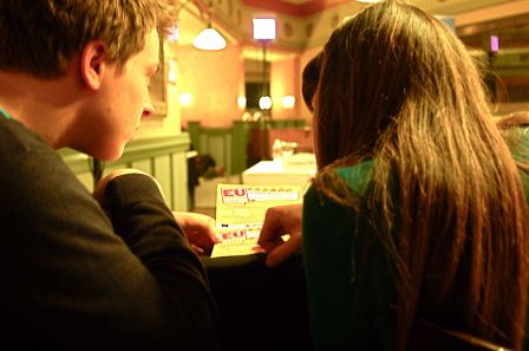
We will certainly see in the upcoming months If the governments realize the importance of R&D and if it be a tool to handle the crisis.



